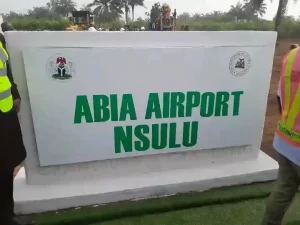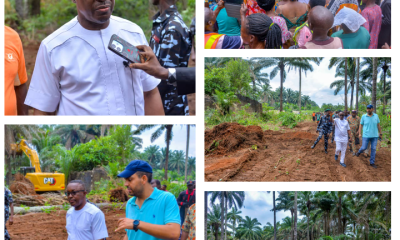SPECIAL REPORT
Abia Airport: Unpacking The Deceit, Lies Of The Nsulu Project

Abia State’s ambitious Nsulu Airport project is increasingly mired in controversy. Allegations of government insincerity, opaque land acquisition practices, and inadequate compensation are fueling discontent among affected communities, casting a long shadow over the project’s purported benefits and raising serious questions about its future viability. ‘BIKE OGBUOKRI dissects the discrepancies between official narratives and the realities experienced by Nsulu landowners, exposing a troubling lack of transparency and a potential for protracted conflict
The Nsulu Airport project, heralded as a catalyst for economic growth in Abia State, is instead enveloped in a miasma of distrust, ignited by accusations of government insincerity and a conspicuous lack of transparency in land acquisition and compensation. While the state government, led by Governor Alex Otti, propagates a rosy picture of amicable agreements and prompt payments, a closer examination, informed by the voices of disgruntled and cheated landowners, reveals a far more complex and disturbing reality.
The recent site inspection on September 12, 2025, led by Hon. Chaka Chukwumerije, Hon. Matt Ekwuribe, SA (Lands & Housing) Pastor Okorougo Aji, and a representative from Craneburg, the construction company, ostensibly aimed at addressing landowner grievances, instead underscored the deep chasm between official pronouncements and the lived experiences of affected communities. The issues raised by the Umuezenta and Umulenwa landowners – unauthorised land clearing, unpaid compensation for land outside the runway area, and delayed payments despite signed indemnity certificates – depict a disturbing portrait of mismanagement and potential malfeasance.
While Chief of Staff to the governor, Dr. Caleb Ajagba acknowledged the need for “clarity to the somewhat opaque situation,” his subsequent observations served to further obscure rather than clarify the true state of affairs. He rightly questioned the absence of a surveyor on the Craneburg team, raising legitimate concerns about future “erroneous damage” to farm produce and the subsequent need for compensation. However, his assertion that landowners resorting to the press reflects “a demonstration of impatience” and “a sign of lack of trust and confidence” smacks of condescension and a failure to acknowledge the root causes of their discontent.
The very act of landowners seeking external recourse highlights a fundamental breakdown in communication and a perceived lack of responsiveness from government officials. As Dr. Ajagba himself stated, “The officials need to review and re-evaluate their engagement strategy to improve and sustain the confidence of the Landowners.” However, this acknowledgement rings hollow when juxtaposed with the government’s persistent downplaying of legitimate concerns and its attempts to portray dissenting voices as unreasonable agitators.
The Chief of Staff’s claim that the complaining landowners are those who “took the government to court” and “refused” to sign indemnity certificates is a blatant attempt to deflect responsibility and demonise those who dare to challenge the official narrative. While acknowledging that over “3500 claimants have been paid,” he conveniently ignores the critical questions surrounding the fairness, adequacy, and transparency of those payments.
This is where the voices of the affected landowners provide a crucial counterpoint. Sir Chinanu Uzoma’s impassioned plea exposes the fundamental flaws in the government’s approach: “Everybody cannot be hungry and too poor to accept your peanut in the name of compensation and sign off our lands to your government.” He directly challenges the integrity of the indemnity forms, branding them “a trap to commit people” and alleging that payments are often disproportionate to the actual land area being acquired. “Our people are literate enough to know that the indemnity form you want them to sign is a trap to commit people and thereby make claims that you have paid, while in essence you are paying some people who have about 20 portions of land for only 1 or 2 portions,” he argues. This raises serious questions about the accuracy of land surveys, the clarity of payment schedules, and the overall fairness of the compensation process.
Uzoma’s demand for transparency – “What is wrong with showing us the surveys of each person and captured and tell us what is paid per plot or per portion so you know what is being expected?” – is a reasonable request that the government has seemingly failed to address adequately. His further accusation that “the committee led by COS has refused to follow the due process of land acquisition and negotiate with the real land owners” paints a picture of a process driven by expediency and a disregard for established legal and ethical standards. This sentiment is echoed in his frustration with “people who have no stake or land in the airport runway are busy positioning themselves as actors in this airport land issue,” suggesting that personal agendas and political manoeuvring are impeding a fair and equitable resolution.
Joshua Onyenkwere further highlights the atmosphere of apprehension fueled by Governor Otti’s earlier statement that “all land owners have been duly compensated.” This premature declaration, seemingly aimed at projecting an image of success, has only served to exacerbate landowner mistrust and deepen the perception that their concerns are being dismissed. “Until that issue is properly addressed,” Onyenkwere warns, “land owners at the proposed airport site will continue to doubt every move by the government.”
The insistence on indemnity certificates also raises concerns. While seemingly a standard legal practice, the timing and context of their implementation in this case suggest an attempt to preempt future legal challenges and silence dissenting voices. By requiring landowners to sign away their rights in exchange for compensation, the government effectively shields itself from potential accountability and limits the avenues for redress available to aggrieved parties. This tactic is particularly troubling given the documented discrepancies and alleged injustices in the compensation process.
Furthermore, the seemingly dismissive attitude towards landowners who have sought legal recourse is deeply troubling. Dr. Emmanuel Dawari rightly asserts that “It is the right of any aggrieved person to go to court and seek redress.” The government’s attempt to portray these legal challenges as the root cause of the delays and discontent is a disingenuous attempt to shift blame and delegitimise legitimate grievances. “True leadership,” Dawari argues, “should wait for the outcome of the court process before proceeding.” By forging ahead with the project while simultaneously vilifying those who have sought legal redress, the government undermines the rule of law and reinforces the perception of insincerity and disregard for due process.
The observations of I.C. Nwankwere, while acknowledging that some payments have been made, further expose the uneven distribution of compensation and the existence of unresolved issues. He highlights the plight of communities like “Ubaha, Umuezeukwu and Umuosu Nsulu” who “have NOT been paid,” and points to “human errors” that have resulted in further delays and injustices. His call for the government to “expedite action and pay those who have not been genuinely paid and correct those anomalies” underscores the urgent need for transparency, accountability, and a genuine commitment to addressing the legitimate grievances of affected landowners.
The Nsulu Airport project, despite its potential economic benefits, is being jeopardised by a pervasive lack of transparency, allegations of unfair compensation practices, and a seemingly deliberate attempt to silence dissenting voices. The government’s narrative of amicable agreements and prompt payments clashes sharply with the lived experiences of the affected landowners, who feel marginalised, ignored, and pressured into accepting inadequate compensation for their ancestral lands.
For the project to truly succeed and benefit the people of Abia State, the government must prioritise transparency, engage in genuine dialogue with affected communities, and ensure that all compensation is fair, equitable, and in accordance with established legal and ethical standards. The current approach, characterised by defensiveness, obfuscation, and a dismissive attitude towards legitimate grievances, only serves to deepen mistrust and sow the seeds of future conflict. Until the government embraces genuine transparency and demonstrates a sincere commitment to addressing the concerns of the affected landowners, the skies over Nsulu will remain murky, and the promise of economic progress will remain grounded in a quagmire of distrust and resentment. The State Government must come clean on how much it has spent on compensation, the criteria used for assessment of land value and who the beneficiaries are. This is the only way to restore confidence and ensure the project does not create long-term conflict and litigation.
-
CRIME4 years ago
PSC Dismisses DCP Abba Kyari, To Be Prosecuted Over Alleged $1.1m Fraud
-
FEATURED4 years ago
2022 Will Brighten Possibility Of Osinbajo Presidency, Says TPP
-
FEATURED2 years ago
Buhari’s Ministers, CEOs Should Be Held Accountable Along With Emefiele, Says Timi Frank
-
BUSINESS & ECONOMY2 years ago
Oyedemi Reigns As 2023’s Real Estate Humanitarian Of The Year
-
SPORTS2 years ago
BREAKING: Jürgen Klopp Quits Liverpool As Manager At End Of Season
-
SPORTS2 years ago
Could Liverpool Afford Kylian Mbappe For €200 million? Wages, Transfer Fee
-
ENTERTAINMENT2 years ago
Veteran Nigerian Musician, Basil Akalonu Dies At 72
-
FEATURED2 years ago
Tribunal Judgement: Peter Obi Warns Of Vanishing Electoral Jurisprudence, Heads To Supreme Court
-
BUSINESS & ECONOMY2 years ago
Oyedemi Bags ‘Next Bulls Award’ As BusinessDay Celebrates Top 25 CEOs/ Business Leaders
-
FEATURED4 years ago
2023 Presidency: South East PDP Aspirants Unite, Demand Party Ticket For Zone


































